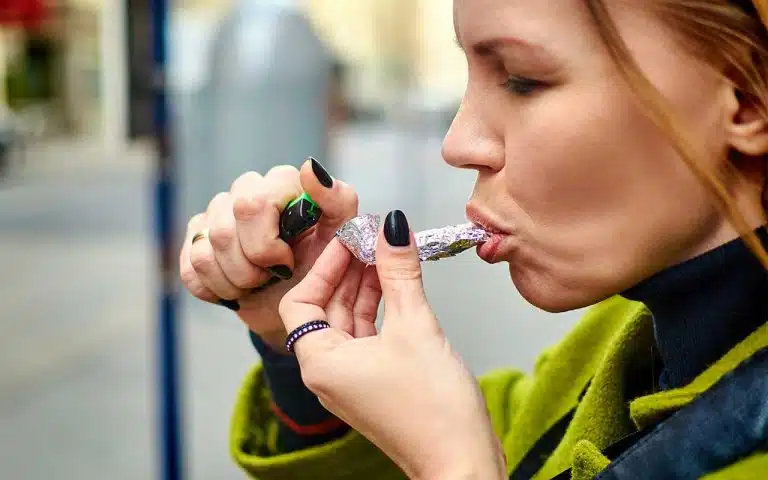The Difference Between Freebase & Crack Cocaine

Many people use the term “freebase” to refer to crack, the smokable form of cocaine. While both freebase and crack cocaine are a crystal substance that can be smoked in a pipe, they aren’t made the same way.
Both methods create a form of cocaine that is highly addictive. If you abuse crack or freebase cocaine, you risk overdose, addiction, and other negative effects.
What’s The Difference Between Crack & Freebase Cocaine?
Crack and freebase cocaine are made with a process that removes the hydrochloride found in powder cocaine. Base cocaine has a much lower melting point than cocaine hydrochloride, so it can be smoked.
Crack is made by mixing cocaine powder with baking soda (sodium bicarbonate) and heating it until it hardens. The name “crack” comes from the crackling sound it makes while being heated. This process is safer than making freebase, but the resulting drug contains impurities.
Freebase cocaine is made using ammonia (a base) and ether (a solvent) to “free the base,” separating the cocaine from the hydrochloride. The result is pure cocaine. However, because ether is highly flammable, this method is more dangerous and is rarely used today.
Negative Effects Of Freebase Or Crack Cocaine Abuse
Freebase and crack cocaine both have an immediate and intense effect when you smoke them. This effect wears off quickly, in as little as five to 10 minutes.
Many people binge by smoking again as soon as the effects start to fade. Binging is usually accompanied by a crash, a period of exhaustion that may last for several days. Other withdrawal symptoms may include depression and insomnia.
More negative effects of freebase or crack cocaine abuse are:
- heart problems, such as irregular heart rate or chest pain that feels like a heart attack
- worsened asthma
- respiratory (breathing) issues
- higher risk of respiratory infections like pneumonia
- burns on fingers or lips from a hot glass pipe
- transmission of diseases like Hepatitis C from sharing saliva or blood on a crack pipe
Smoking crack or freebasing can also make you feel irritable, hypersensitive, or even paranoid.
Can You Overdose On Crack Or Freebase Cocaine?
You can overdose on crack or freebase cocaine. Smoking cocaine takes it straight to your brain, rather than passing it through your body first, so it’s more potent.
Some people don’t realize that the effects are different than snorting cocaine powder. They may take too much, thinking they can handle it, or they might have an unexpected adverse reaction.
Binging crack or freebase cocaine causes it to build up in your system, raising toxicity to dangerous levels. Your body can’t process the drug as fast as you can smoke it.
Mixing cocaine with other stimulants also increases the risk of overdose. Smoking crack or freebasing while taking central nervous system depressants—like opioids or alcohol—is dangerous too. It can be difficult to tell when you’ve had too much of either drug.
Is Crack Or Freebase Cocaine More Addictive?
Cocaine (in any form) is a Schedule II controlled substance because it has a high potential to be abused and is very addictive. Crack and freebase are often seen as the most dangerous forms of cocaine.
When you use cocaine, it affects your brain’s reward system. The brain produces less natural “feel-good” chemicals because cocaine gives you the boost instead. As a result, you depend on cocaine for the reward and have a hard time feeling good without it. You become addicted.
The rapid rise and fall of a crack or freebase high increases the risk of addiction. Binging also makes addiction more likely.
Because smoking produces a high that’s concentrated in the brain, some people have cravings after their first time smoking crack. Cravings (a strong mental desire to take a drug) often lead someone to keep smoking and develop an addiction.
Cocaine Addiction Treatment Options
If you or someone you love is suffering from cocaine addiction, effective treatment is available.
Cocaine addiction treatment combines methods like behavioral therapy, counseling, and exercise. The goal is to resolve deep-rooted issues that lead to substance abuse and poor mental health. You also learn healthy habits for a more fulfilling life without drugs.
Treatment may take place in an inpatient or outpatient setting, depending on your personal needs. Many people benefit from inpatient care, which removes them from negative influences and places them in a supportive community.
To learn about our comprehensive cocaine rehab programs at Ark Behavioral Health, reach out to a treatment specialist today.
Written by Ark Behavioral Health Editorial Team
©2024 Ark National Holdings, LLC. | All Rights Reserved.
This page does not provide medical advice.
Britannica - Cocaine
National Institute on Drug Abuse - Cocaine DrugFacts
The University of Arizona - Chemistry

Questions About Treatment?
Ark Behavioral Health offers 100% confidential substance abuse assessment and treatment placement tailored to your individual needs. Achieve long-term recovery.
100% confidential. We respect your privacy.
Prefer Texting?
Our friendly support team is here to chat 24/7. Opt out any time.







 Learn More
Learn More








